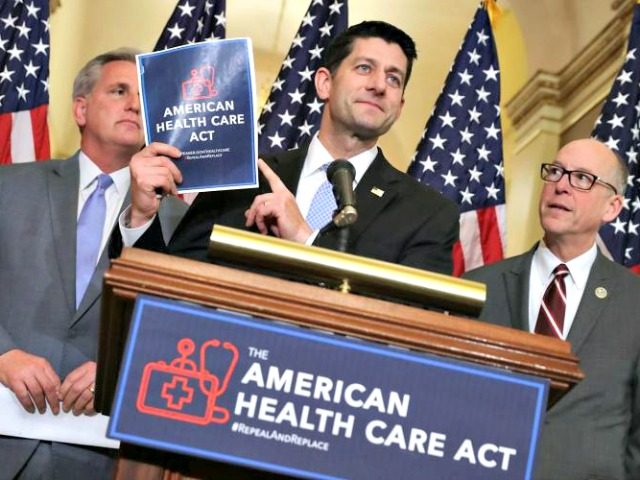The Heritage Foundation’s Ed Haislmaier told Breitbart News that Congress’s health care bill acts as damage control for Obamacare.
Haislmaier told Breitbart that the House’s American Health Care Act (AHCA) will move health care in the right direction, although, the Senate can make improvements to the bill. He said, “It is progress, and now it moves over to the Senate. The Senate is really the final decision maker where it is really going to make a difference.”
The Heritage scholar added that he likes the idea of a tax credit to purchase health insurance, however, there could be better ways to model the tax credit. He said, “I think the problem with the House’s tax credit is that they could have more thoroughly modeled different ways of doing it, and hopefully in the Senate, they can have several variants and come up with a better design.”
Senator Bill Cassidy (R-LA) proposed a solution for higher premiums that would auto-enroll Americans without health insurance into a basic, catastrophic health care plan paid for by an individual’s federal tax credit. The Louisiana senator explained, “Your best way to lower premiums is to expand the risk pool … auto-enrollment would allow expansion of the risk pools.”
Haislmaier noted some of the complexities behind the idea of auto-enrolling Americans who forgo health insurance. He stated:
As for auto-enrolling Americans without health insurance, you are mainly talking about a group of low-income people who choose not to buy insurance even if they are healthy. It’s a practical question how do you make that work and stay with it, and especially for people who are loosely connected to the workforce, and don’t have a lot of income and usually go to a clinic to get care. This is the problem with expanding Medicaid; it does not do a lot to change their behavior, it does a lot more to get the hospital paid.
So there’s a number of issues you have to think through on that, that I believe they have to do.
Once you enroll people, how do you keep them in the system? They do not want to pay nominal premiums, and that’s what happened with Obamacare. With Obamacare, we got them insured in very subsidized coverage, and the insurers were surprised that once they were healthy, they would not even pay ten bucks to keep the coverage.
It is a technical issue, how do you work through that and make it better?
Haislmaier told Breitbart News that the Senate bill should mirror the MacArthur amendment to lower premiums. The MacArthur amendment allows states to obtain waivers to rollback Obamacare regulations. He said:
It is not easy to balance out covering pre-existing conditions with lower premiums, that is where you saw some of the political difficulty in the House, and that’s how they came up with the solution of the MacArthur amendment, which allows states to lower premiums through a waiver. I think that the process, doing this as part of a budget reconciliation, means that the best you can get out of this is some sort of waiver system.
Haislmaier responded to some critics of the AHCA that the bill does too little, too late. The state waivers for Obamacare regulations would only apply as early as 2019 and only if the state applies for the waiver. Haislmaier pointed out:
That’s why they tied in some additional stabilization funding, they recognized that some of the regulatory actions could not be done right away and to make it acceptable for reconciliation they have to tie some money to the bill. They’re going to offer states additional funding and other regulatory relief with the expectation that they’ll use the extra funding to initially to keep things going for the next year or so before the relief can kick in. Keep in mind the target here is not the subsidized ACA exchange market, the target is the market that’s tied to it, the non-subsidized regular insurance market, that’s where the spillover effect is. That’s where everyone is experiencing higher premiums, deductibles, loss of insurers, and providers, and they’re getting nothing in return. What they’re trying to save is the market outside of the exchanges, for the individual and small employer plans.
The ACA dumped a whole bunch of costly people to that market, and you got to disentangle that and keep those non-subsidized people and keep insurance affordable for them. What they’re trying to do with the stabilization funding is to provide insurers with some stabilization to help bring down premiums. This is a rescue effort at this point. There is a number of things that the Trump administration has done for 2018, and they can do more things for 2019 and beyond.
Congress under the best circumstances, would not have been able to affect health insurance plan year 2018, what Congress is working on is for further down the road.
Haislmaier told Breitbart News that Congress’s efforts for repealing Obamacare basically amounts to damage control, not true health care reform. He explained, “Let’s be clear this is not health reform, this is damage control for Obamacare. There’s a lot more to be done. It’s not going to happen overnight.”

COMMENTS
Please let us know if you're having issues with commenting.